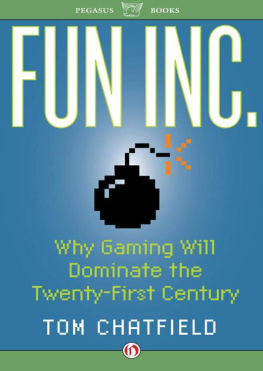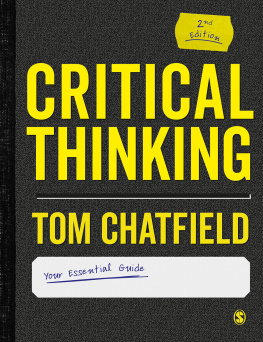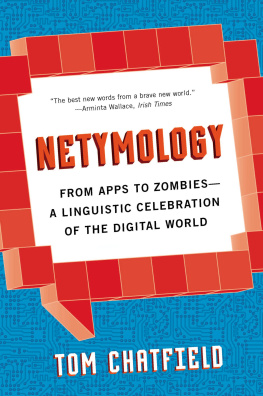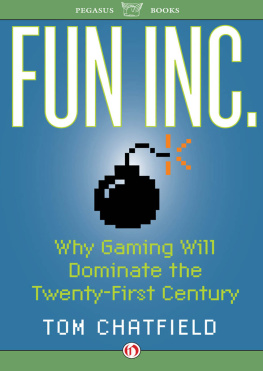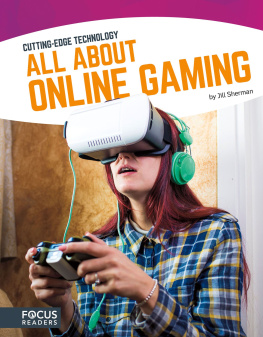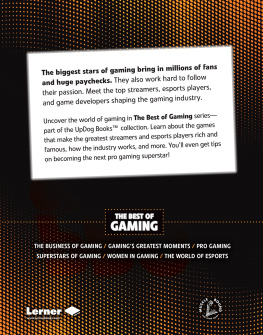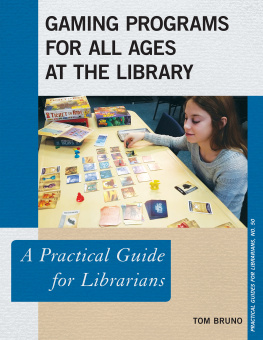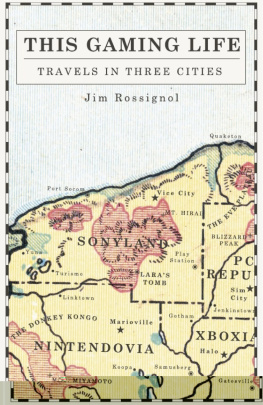Tom Chatfield - Fun Inc.: Why Gaming Will Dominate the Twenty-First Century
Here you can read online Tom Chatfield - Fun Inc.: Why Gaming Will Dominate the Twenty-First Century full text of the book (entire story) in english for free. Download pdf and epub, get meaning, cover and reviews about this ebook. year: 2011, publisher: Pegasus Books, genre: Romance novel. Description of the work, (preface) as well as reviews are available. Best literature library LitArk.com created for fans of good reading and offers a wide selection of genres:
Romance novel
Science fiction
Adventure
Detective
Science
History
Home and family
Prose
Art
Politics
Computer
Non-fiction
Religion
Business
Children
Humor
Choose a favorite category and find really read worthwhile books. Enjoy immersion in the world of imagination, feel the emotions of the characters or learn something new for yourself, make an fascinating discovery.
- Book:Fun Inc.: Why Gaming Will Dominate the Twenty-First Century
- Author:
- Publisher:Pegasus Books
- Genre:
- Year:2011
- Rating:3 / 5
- Favourites:Add to favourites
- Your mark:
- 60
- 1
- 2
- 3
- 4
- 5
Fun Inc.: Why Gaming Will Dominate the Twenty-First Century: summary, description and annotation
We offer to read an annotation, description, summary or preface (depends on what the author of the book "Fun Inc.: Why Gaming Will Dominate the Twenty-First Century" wrote himself). If you haven't found the necessary information about the book — write in the comments, we will try to find it.
Tom Chatfield: author's other books
Who wrote Fun Inc.: Why Gaming Will Dominate the Twenty-First Century? Find out the surname, the name of the author of the book and a list of all author's works by series.
Fun Inc.: Why Gaming Will Dominate the Twenty-First Century — read online for free the complete book (whole text) full work
Below is the text of the book, divided by pages. System saving the place of the last page read, allows you to conveniently read the book "Fun Inc.: Why Gaming Will Dominate the Twenty-First Century" online for free, without having to search again every time where you left off. Put a bookmark, and you can go to the page where you finished reading at any time.
Font size:
Interval:
Bookmark:


Why Gaming Will
Dominate the
Twenty-First-Century
TOM CHATFIELD

PEGASUS BOOKS
NEW YORK
For Mum, Dad and my wife, CatContents
Preface to the American Edition
In April 2008, my friend Jon flew from North Carolina to visit me in England. Jon manages a store in a small town in Gaston County, just outside Charlotte, and this was the first time hed travelled outside America; hed had to get his first ever passport for the trip. It was also the first time wed met face to face, although wed known each other for almost two years.
Jon and I met in World of Warcraft, a game that my wife, Cat, and I have played ever since it launched in 2004. The three of us started out helping each other with in-game tasks. Then, as we got to know each other better, we moved on to talking through microphones and headsets while playing. We swapped emails, linked up on Facebook, discussed books and films, and pieced together the details of our very different lives. Jon was smart, in his early twenties and had dropped out of college due to funding difficulties; Cat and I were working long hours in medicine and publishing, and World of Warcraft offered us a sociable, absorbing evening out, away from the pressures of daily life.
We often think of video gamesand of digital culture in generalas a substitute for worldly encounters, and a troubling one at that. Yet our appetite for the digital has grown hand in hand with an increasing recognition of the value of the live and the interpersonal; and, above all, of the importance of the social aspects of technology. More than anything else, it is these sociable, interpersonal forces that are driving forward the next stages of the digital revolution. Jon was the first gaming friend of mine to visit us in London, but not the last: since his stay, several others have made the journey across the Atlantic, while my wife and I have travelled up and down Americas east coast visiting and staying with people we first got to know through video games.
What this means is that the blank spaces on our map of America have been filling up, gradually, with individual human voices and faces. And while video games are far from the only reason we know people outside our own country, they have meant that we know people far off the tourist trail: people managing stores in small towns, living in military bases, serving their country abroad, raising families at home.
Video games have been a central part of this process not because theyre uniquely powerfulalthough the shared experience of play is, at its best, one of the most universal of all human undertakingsbut because theyre an increasingly central part of both American culture and of an emerging global culture. I believe that this culture has the power to re-mould the 21st century at least as radically as cinema and television did the 20th.
This is a shamelessly partisan book about video games, and I make no apologies for that. Over the last decade, alongside my work writing a doctorate and teaching literature, working as an arts and books editor in London, and speaking and writing on technology and the arts, my experience of games has been a hugely enriching part of my life. This is something I hope to share and explore.
This isnt, however, a book about why games are good any more than it can be a repudiation of why they are not bad. These kind of statements are as meaningless as it would be to reduce every book ever written or every film ever shot into a single opinion. Its precisely because I love games that Im anxious to point out that 90 percent of the titles out there are not good enough. In everything from their artistic merit to their playability, design and quality assurance, they could be better. Sometimes they are awful, objectionable, banal, or simply not enjoyable. This is to be expected. Contrary to the popular myth of electronic entertainments as implacable engines of manipulation, it is very difficult indeed to make a decent video game, let alone an excellent one. Creating great games is both an art and a scienceindeed, its one of the most demanding digital activities its possible to undertake.
America is the worlds greatest video-gaming nation, and it should be proud of this status. It dominates globally in terms of the value of its market, but also in the sophistication of its audience and the quality of its industry. Its thanks to games, in large part, that I have got to know America as I do. Or, to be more precise, its thanks to games that I have got to know certain Americans. I am far from alone in this. The greatest value and interest of any medium is always the human experiences it enables, not the machinery in which it encodes them. And, at their best, electronic games can show us at our best: creatively, socially, politically and intellectually.
Wanting video games to be better is a central part of loving them. But the anatomy and criticism of games is a task for a different book to this one. Indeed, its a task already being undertaken with considerable sophistication and relish by the gaming community both online and in print. What I hope to achieve is something at once simpler and more fundamental: to explore why video games are worth taking seriously in the first place; to suggest the nature and range of the discussions it is worth having around them; and to show how these discussions may help us to understand our cultures increasing augmentation and amplification by technology.
If there is a fundamental message here, it is of continuity, not transformation. To face the future hopefully, together with all the possibilities of its technology, we must remember that we humans are the same as we ever were. It is only our possibilities of being and action that have changed: we are more stimulated, more distracted, more interconnected, more challenged, more able to learn, more able to lose ourselves than ever before.
This book was largely written in 2009, which means that, in a field defined by constant innovation, its contents are already some distance from the cutting edge. Im not too worried about this. I hope that what comes through is my belief that by far the most interesting things about both video games and people are those aspects of them that will not transform in the space of twelve months, twelve years, or even half a century. The reasons that games exert so deep and broad an appeal are very ancient, and if were to have any hope of understanding the future more than a year at a time, we must take the long perspective.
Finally, as I write these words in mid-2010, one word in particular looks in urgent need of retirement: gamers, that segment of the population who know and play video games. For there is fast becoming no us or them when it comes to games. In 2009, the National Gamers Survey reported that 83% of the U.S. population played video games, including 72% of men and women over 50. Whatever your opinion on video games, they will soon be universal. Within another generation they have their place in every home and pocket, as inevitable as a computer or mobile phone. This is neither a dreadful nor a marvelous fact: it is an aspect of the world we must learn to live with and understand as best we can.
We need to take this word gamers and throw it away, together with all those other generalizations that open up no debate and that mask the future under vague hopes and wild fears. We need to talk seriously, now, about how to get the best out of games, where the worst really lies, and what the games we play can tell us about ourselves and our future. The news may not all be good. But we cannot afford to ignore it.
Next pageFont size:
Interval:
Bookmark:
Similar books «Fun Inc.: Why Gaming Will Dominate the Twenty-First Century»
Look at similar books to Fun Inc.: Why Gaming Will Dominate the Twenty-First Century. We have selected literature similar in name and meaning in the hope of providing readers with more options to find new, interesting, not yet read works.
Discussion, reviews of the book Fun Inc.: Why Gaming Will Dominate the Twenty-First Century and just readers' own opinions. Leave your comments, write what you think about the work, its meaning or the main characters. Specify what exactly you liked and what you didn't like, and why you think so.

